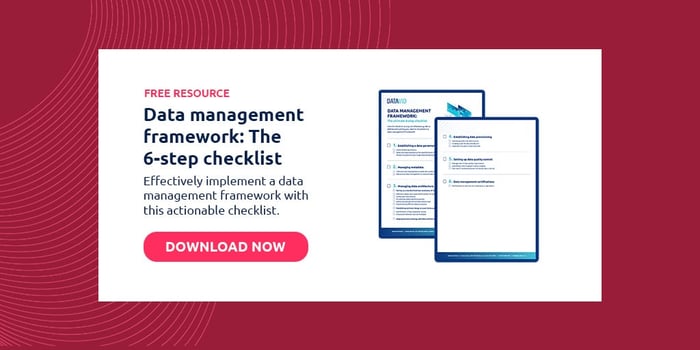2 minute read
Here’s why enterprise data security shouldn’t be an afterthought
Research shows that more than 50% of security breaches are the result of a careless employee. Here's why enterprise data security matters.
Table of contents
Market research shows that more than 50 percent of security breaches are the result of a careless employee.
The main risks associated with it are:
- Compliance fees as regulations and rules are enforced when it concerns data privacy. From May 2018 onwards, GDPR is a good example of a data privacy law protecting consumers and employees—a model that is increasingly being adopted globally.
- Brand and reputational damage, especially when a data security breach goes into the public domain and attracts the attention of enforcement agencies.
- Customer churn as consumers are entitled to know what data is being stored and make data privacy requests at any time—including their right to be forgotten.
But what is data security?
Wikipedia defines data security as:
A means of protecting digital data, such as those in a database, from destructive forces and unwanted actions of unauthorized users, such as a cyberattack or a data breach.
Digital Guardian further explains that “data security involves putting in place specific controls, standard policies, and procedures to protect data from a range of issues, including:
- Unauthorised access
- Accidental loss
- Destruction
It is important to know that minimising the impact of a data privacy breach due to a human error requires adequate legal and compliance policy and education of employees.
Centralising your data management in a platform with government-grade, granular security controls will ensure that data is only shared with appropriate individuals or organisations.
This is explained in my previous article for International Association for Privacy Data Professionals about GDPR and its implications for business.
How to deal with the challenge of data security
One way of tackling this challenge is to create an operational data hub as a central storage of all your data in one place, and creating business applications to manage and analyse the data.
Datavid, in partnership with MarkLogic, can achieve both data integration and security objectives, providing business-focused applications so that end users can quickly retrieve and analyse not just the data itself but also risks associated with it. In a recent FT article, the author comments that:
The Biden administration’s cyber security executive order provides guidance to federal agencies to establish a ‘zero trust’ relationship with their supply chains to protect data.
The idea of ‘zero trust’ is a pillar of data security, which is why Datavid focuses heavily on ensuring that both external and internal threats are treated with equal severity.
Securing your enterprise data from the inside-out
To enjoy the benefits of zero trust data security, it’s important to structure your efforts from the inside-out; understanding how information is protected internally before expanding that effort to third-parties as well.
This forms a foundational architecture to work of.
Using a data hub implementation is advantageous in this case, as it allows to protect and monitor internal sources while detecting potential threats from external ones.
Datavid champions data hub security and works to enable best practices from the ground-up, so that your enterprise doesn’t have to worry about breaches nearly as much.
To learn more about every aspect that revolves around enterprise data (including security), check out our previous post on enterprise data management frameworks.
Frequently Asked Questions
Why is data security a concern?
Data security is a concern because unauthorised access, breaches, or misuse of data can lead to significant risks and consequences. It can result in financial losses, damage to reputation, regulatory non-compliance, legal liabilities, and compromised customer trust. Protecting data is crucial to safeguard sensitive information, maintain privacy, meet regulatory requirements, and ensure the overall security and integrity of an organization's operations.
What are the 3 types of data security?
The three types of data security are physical security, technical security, and administrative security.
What are examples of data security?
Examples of data security measures include encryption, access controls, firewalls, intrusion detection systems, data backup and recovery, security audits, data classification, security awareness training, incident response planning, and regulatory compliance.




